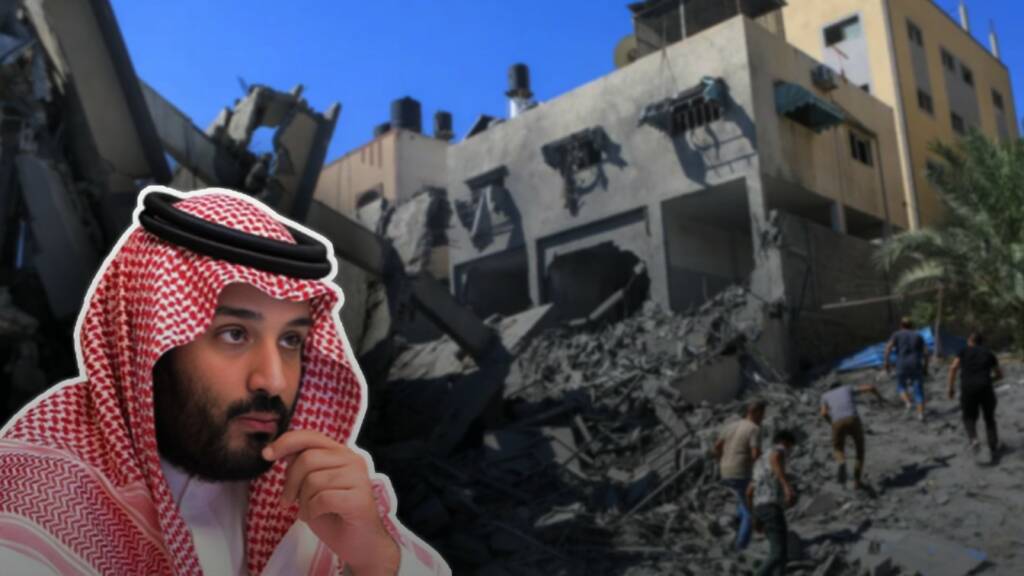Israel-Gaza war and Saudi Arabia: In pursuit of becoming the leading Arabic superpower, Saudi Arabia’s aspirations have long been anchored in its energy dominance. However, recent involvement in the Middle-Eastern turmoil, particularly the Israel-Gaza war, has disrupted Saudi Arabia ambitions. The country’s economy is set to face setbacks. Saudi Arabia’s entanglement in the Middle-Eastern chaos has transformed its dream of supremacy into a challenging reality.
Gloomy Financiers and Fractured Deals
Amidst the ongoing Israel-Gaza war, Saudi Arabia finds itself facing a significant economic challenge. This turmoil has cast a shadow over Saudi Arabia’s efforts to attract foreign investments, impacting the annual flagship event in the country, often referred to as “Davos in the Desert.” Top financiers from Wall Street, who traditionally use this platform to engage with Saudi Arabia’s major companies and its substantial sovereign wealth fund, have expressed pessimism about the global economy.
The conflict has not only disrupted potential deals but also led to a reevaluation of Saudi Arabia’s foreign policy. The kingdom has put on hold U.S.-backed plans to establish official relations with Israel, signaling a rapid shift in its approach. World Bank President Ajay Banga highlighted that these geopolitical tensions in the Middle East pose a significant threat to the global economy.
Read More: Israel-Gaza War! You Still Don’t Understand Biden’s Sinister Agenda
In essence, Saudi Arabia’s involvement in the Israel-Gaza conflict has immediate consequences, impacting its economic prospects and leading to a reconsideration of its foreign policy initiatives, ultimately shaping the nation’s near-term future in the international arena.
Quandary of Saudi Arabia in the Israel-Gaza War!
Saudi Arabia’s decision to halt the Israel deal jeopardizes a central aspect of its foreign and domestic strategies: the regional “de-risking” efforts. With Crown Prince Mohammed bin Salman’s ‘Vision 2030’, an ambitious economic and social initiative, the kingdom aims to position itself as a hub for tourism and investment. However, amidst escalating Middle East violence, achieving stability becomes increasingly challenging.
Recent positive developments, like the Abraham Accords and the restoration of Saudi-Iranian relations, had fostered regional cooperation. Initiatives like the India-Middle East-Europe Economic Corridor showcased the potential for economic growth to divert attention from the Israeli-Palestinian issue. However, the Israel-Gaza conflict now tests Gulf states’ delicate balance between supporting the Palestinian cause publicly while making diplomatic inroads with Israel and the US. and clearly, Saudi Arabia chose the second one.
Saudi Arabia’s Reconciliation Saga
Israel-Gaza war poses a significant hurdle to the normalization efforts between Saudi Arabia and Israel. Riyadh, in constant talks with the U.S. about these normalization plans, has expressed a desire for a nuclear deal akin to Iran’s as a precondition. However, the conflict erupted just as Israel was on the brink of establishing ties with Saudi Arabia. This development has put the normalization process on hold due to the influence of the Muslim Brotherhood within Saudi Arabia, making it improbable for the nation to support Israel’s actions in Gaza.
Saudi Crown Prince Mohammed bin Salman, aware that his major voter base comprises supporters of the Muslim Brotherhood, understands the political risks of opposing them. To retain his power, he has publicly affirmed support for the Palestinian cause, pledging assistance for their legitimate rights and aspirations. This stance, while aimed at maintaining domestic stability, has turned Saudi Arabia against Israel. Consequently, this shift has jeopardized the country’s global standing and the inflow of foreign investments.
UAE’s Wisdom vs. Saudi’s Struggles
Saudi Arabia must take lessons from the most sensible and hence prosperous country on the planet that is the UAE. Saudi Arabia condemned Israel’s actions concerning Hamas, while the UAE adopted a more restrained stance. The UAE, while empathetic to Palestinians, categorizes Hamas as a terrorist organization.
Read More: MBS is changing the face of Saudi Arabia but he has hit the Islamist wall
UAE has always held a cautious approach, separating economic interests from political conflicts bolstering the nation’s prosperity. By avoiding extreme positions and promoting peace, the UAE has become the most prosperous country in the Arab world. Notably, the UAE’s ability to remain aloof from Western influence, especially directives from the USA, further sets it apart.
In contrast, Saudi Arabia, desiring normalization with Israel, faced challenges due to its association with the Muslim Brotherhood, leading to a different approach. While the UAE’s strategy has yielded economic benefits and global recognition, Saudi Arabia navigates a more complex path influenced by various political factors.
Watch More:
